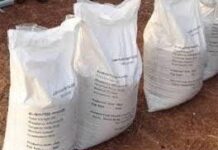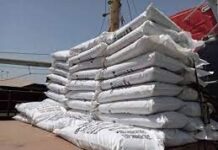with Abdoulie Dibba
This Column is meant to monitor and report on issues that are of concern  to the people of the rural area in terms of the facilities and services rendered to them.
In the last edition we drew the attention of our readers to the views of the Rural Women in the Niaminas with regard to Access, Control and Ownership of Land as expressed by Rural Women during the Activista’s community sensitization and in this edition, we will feature the views of the Rural Women in Niumi.
ACTIVISTA The Gambia in Partnership with AAITG have organized community sensitization meetings as the base towards the formation of Rural Women Assemblies in AAITG Local Right Programme Areas in Niamina East, Naimina West, Naimina Dankunku in CRR, and Upper Nuimi Districts in NBR.
The majority of Gambian women are rural based and are engaged in agricultural production. As agriculturists they produce the bulk of the food for local consumption.
In spite of their important role as producers, there is still an adherence to the traditional processes that have made women a marginalized group of people in the society. The priority given to male children in our patriarchal society has ensured male dominance in the decision making process.
The Rural Women Assemblies in AAITG Local Rights Programme Areas are to serve as a forum where women issues are raised and discussed in order to address their needs and concerns.
The sensitizations meetings brought together 166 people ranging from local authorities like elected Ward Councillors, District Seyfololu, Alkalolu, youth leaders (Activistas), Women Councillors, Women Pressure Groups Leaders, Leaders in AAITG Apexes, Eco zones and Smallholder Women Farmers to discuss issues affecting women ownership and control over land, land grabbing in Africa, solutions to the problems and importance of farm land for women to the eradication of poverty and hunger in The Gambia.
A ten person campaign team includes Activista and AAITG staff and volunteers, partners like National Farmer platform, NAWFA, ADWAC, National Alliance for Food Security (NAFS).
In the discussions, the women lamented the forest law that does not allow smallholder farmers to clear or cut any part of the forest for crop cultivation at a time when farming activities in The Gambia have changed due to climate changes.
Fatou Sarr of Mbantang Village in the Upper Nuimi District stated that in the past, women where destined to the rice field which are swamp and that the men were destined to farm land which are the upland.
However she, with the advent of the NERICA Rice and the salinity of the swamp rice fields, farming activities have moved from the swamp to upland which has resulted to land scarcity in some rural area.
According to her, Women did not have the right to own land, as the culture and tradition did not allow it.
Kumba Sanyang of Toubakolon in Upper Nuimi, told the meeting that there is need to review the land tenure system in the Gambia because the reality is that the custom and tradition governing land in the Gambia does recognize women ownership of land.
Kumba asserted that the concept that women are going to marry into another family different from their family and therefore should not acquire land from their father’s land.
She told the meeting that what culture and tradition failed to realise is that “if Binta is married to a man who is not a Gambian and does not have land, where would their children farm to earn a living if Binta is not entitled to own land from their family land”.
According to Awa Samateh of Albreda, some community leaders did not respect the Islamic Law that gave the woman the right to inherit any anything from the father including land.
She told the meeting that after the death of their father, who did not leave any male issue behind, the Village Alkalo (village head) took their family land from them and is now been used as a spot for sand mining while she and her sisters are not benefitting from the income generated from the area and have no where to farm.
They said women cannot own land in their family. She added that what they cannot understand is that some women work hard with their husbands to develop the family land, but when the marriage ends, the woman’s access to that land is terminated and this needs to be look into.
]]>
to the people of the rural area in terms of the facilities and services rendered to them.
In the last edition we drew the attention of our readers to the views of the Rural Women in the Niaminas with regard to Access, Control and Ownership of Land as expressed by Rural Women during the Activista’s community sensitization and in this edition, we will feature the views of the Rural Women in Niumi.
ACTIVISTA The Gambia in Partnership with AAITG have organized community sensitization meetings as the base towards the formation of Rural Women Assemblies in AAITG Local Right Programme Areas in Niamina East, Naimina West, Naimina Dankunku in CRR, and Upper Nuimi Districts in NBR.
The majority of Gambian women are rural based and are engaged in agricultural production. As agriculturists they produce the bulk of the food for local consumption.
In spite of their important role as producers, there is still an adherence to the traditional processes that have made women a marginalized group of people in the society. The priority given to male children in our patriarchal society has ensured male dominance in the decision making process.
The Rural Women Assemblies in AAITG Local Rights Programme Areas are to serve as a forum where women issues are raised and discussed in order to address their needs and concerns.
The sensitizations meetings brought together 166 people ranging from local authorities like elected Ward Councillors, District Seyfololu, Alkalolu, youth leaders (Activistas), Women Councillors, Women Pressure Groups Leaders, Leaders in AAITG Apexes, Eco zones and Smallholder Women Farmers to discuss issues affecting women ownership and control over land, land grabbing in Africa, solutions to the problems and importance of farm land for women to the eradication of poverty and hunger in The Gambia.
A ten person campaign team includes Activista and AAITG staff and volunteers, partners like National Farmer platform, NAWFA, ADWAC, National Alliance for Food Security (NAFS).
In the discussions, the women lamented the forest law that does not allow smallholder farmers to clear or cut any part of the forest for crop cultivation at a time when farming activities in The Gambia have changed due to climate changes.
Fatou Sarr of Mbantang Village in the Upper Nuimi District stated that in the past, women where destined to the rice field which are swamp and that the men were destined to farm land which are the upland.
However she, with the advent of the NERICA Rice and the salinity of the swamp rice fields, farming activities have moved from the swamp to upland which has resulted to land scarcity in some rural area.
According to her, Women did not have the right to own land, as the culture and tradition did not allow it.
Kumba Sanyang of Toubakolon in Upper Nuimi, told the meeting that there is need to review the land tenure system in the Gambia because the reality is that the custom and tradition governing land in the Gambia does recognize women ownership of land.
Kumba asserted that the concept that women are going to marry into another family different from their family and therefore should not acquire land from their father’s land.
She told the meeting that what culture and tradition failed to realise is that “if Binta is married to a man who is not a Gambian and does not have land, where would their children farm to earn a living if Binta is not entitled to own land from their family land”.
According to Awa Samateh of Albreda, some community leaders did not respect the Islamic Law that gave the woman the right to inherit any anything from the father including land.
She told the meeting that after the death of their father, who did not leave any male issue behind, the Village Alkalo (village head) took their family land from them and is now been used as a spot for sand mining while she and her sisters are not benefitting from the income generated from the area and have no where to farm.
They said women cannot own land in their family. She added that what they cannot understand is that some women work hard with their husbands to develop the family land, but when the marriage ends, the woman’s access to that land is terminated and this needs to be look into.
]]>


















